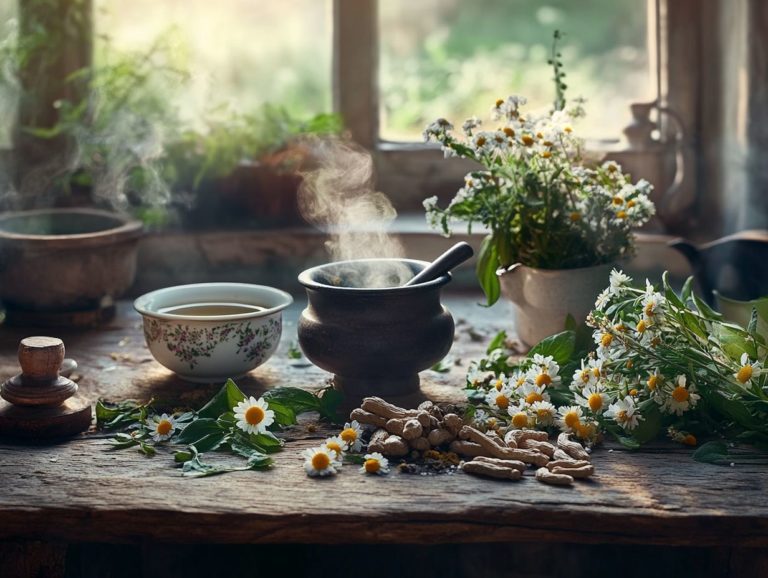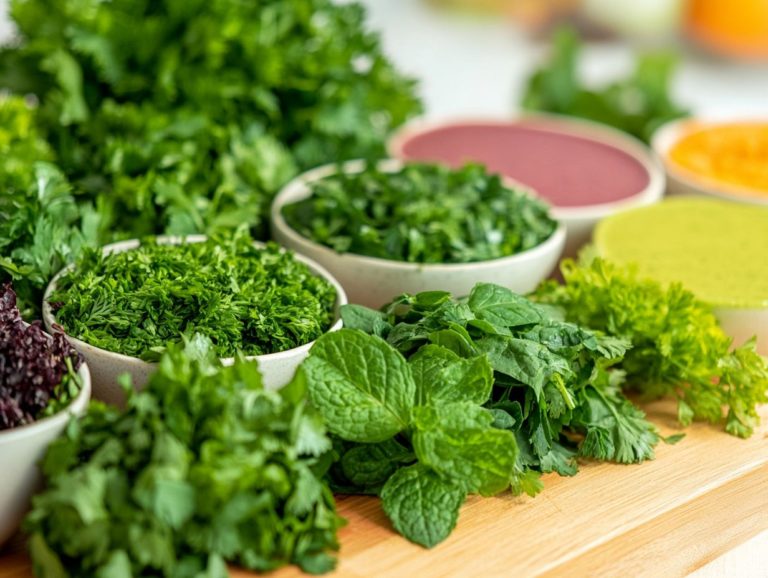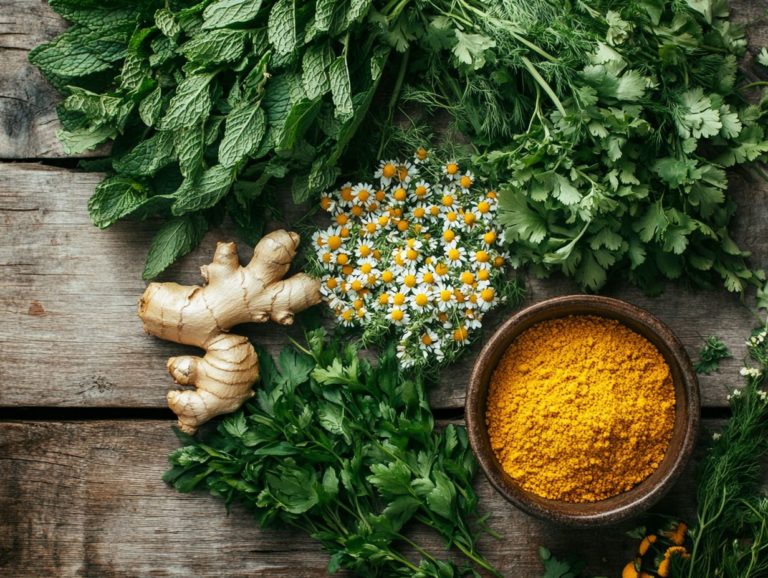5 Herbal Remedies for Women’s Health
Women’s health presents a spectrum of unique challenges, ranging from hormonal imbalances to menstrual discomfort. Many are increasingly seeking herbal remedies as a natural approach to enhance their well-being.
Discover five powerful herbs that can transform your health: Red Raspberry Leaf, Black Cohosh, Dong Quai, Evening Primrose Oil, and Chaste Tree Berry. These herbs have been cherished for generations in promoting women s health.
We will explore their benefits and potential risks, along with practical tips for seamlessly integrating these remedies into your daily routine.
Unleash the potential of these natural remedies and take charge of your health journey today!
Contents
- Key Takeaways:
- 1. Red Raspberry Leaf
- 2. Black Cohosh
- 3. Dong Quai
- 4. Evening Primrose Oil
- 5. Chaste Tree Berry
- What Is Herbal Medicine and How Does It Work?
- What Are the Benefits of Using Herbal Remedies for Women’s Health?
- What Are the Potential Risks and Side Effects of Herbal Remedies for Women’s Health?
- How Can One Incorporate Herbal Remedies into Their Daily Routine for Women’s Health?
- What Are Some Common Health Issues for Women That Can Be Treated with Herbal Remedies?
- What Are Some Tips for Choosing and Using Herbal Remedies for Women’s Health?
- Frequently Asked Questions
Key Takeaways:
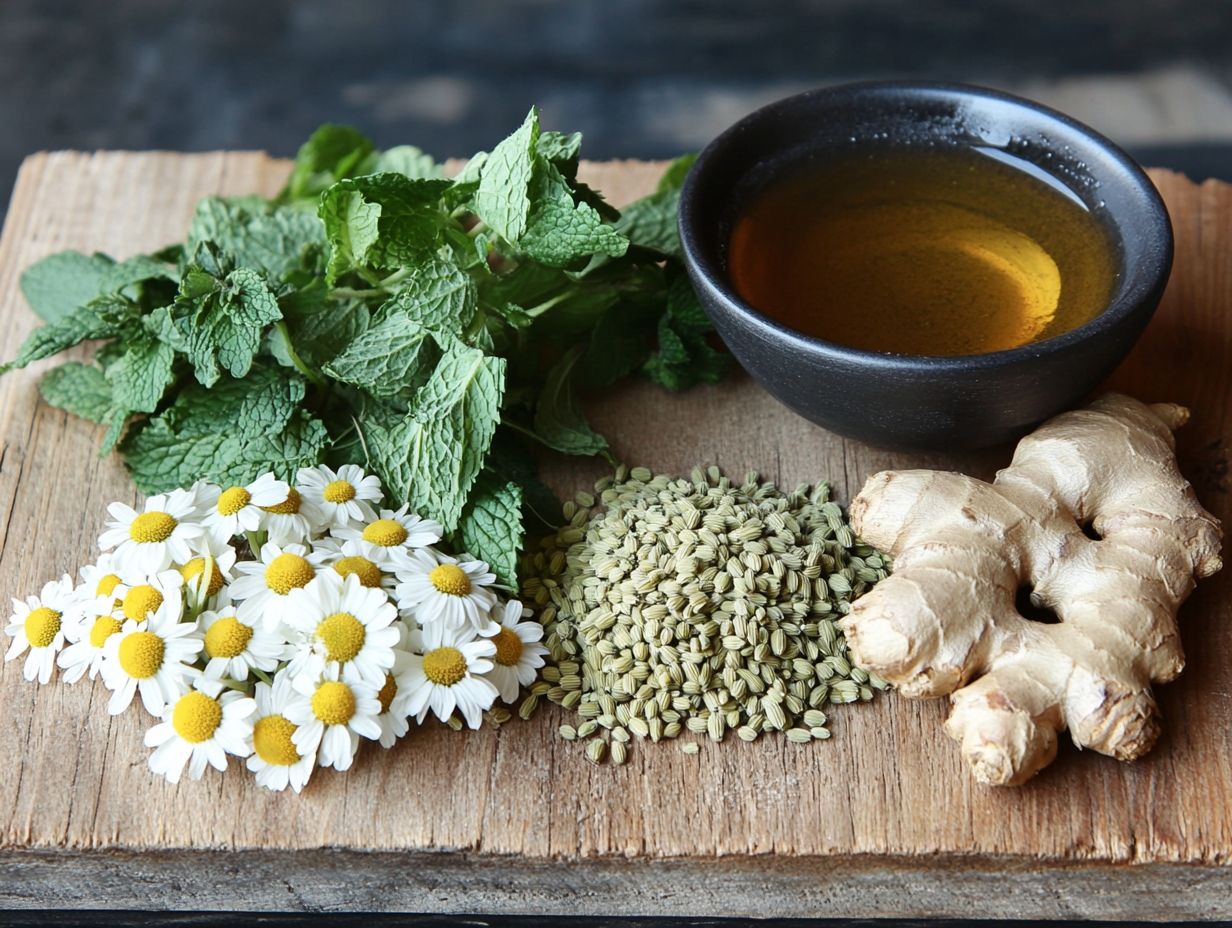
- Red raspberry leaf can help regulate menstrual cycles and alleviate symptoms of PMS and menopause.
- Black cohosh is commonly used to treat hot flashes and other menopausal symptoms.
- Dong quai is known for its ability to balance hormones and relieve menstrual cramps and menopausal symptoms.
1. Red Raspberry Leaf
Red Raspberry Leaf is a remarkable herbal remedy, renowned for its numerous benefits in supporting women’s health. It plays a crucial role in reproductive wellness and hormone balance.
This herb is a staple in many holistic health practices, particularly those focused on menstrual cycles and uterine health. It eases menstrual cramps and discomfort, offering much-needed relief during that time of the month.
By maintaining hormonal balance, it can help mitigate mood swings and irregular cycles. Nurturing overall reproductive health, Red Raspberry Leaf gives you the power to continue your journey toward wellness.
It also prepares your body for conception and supports a healthy pregnancy, making it a cherished ally in the quest for optimal uterine health.
2. Black Cohosh
Black Cohosh is celebrated for its effectiveness in alleviating menopause-related symptoms. It’s a popular choice for those seeking natural solutions to achieve hormone balance and enhance emotional well-being.
This remarkable plant has a long-standing reputation for acting like estrogen within the body. Many women have found relief from hot flashes, night sweats, and mood swings after integrating Black Cohosh into their daily routines.
Its properties help the body manage stress and enhance physical comfort, nurturing a balanced state of mind. By opting for herbal supplements like this, you can discover a holistic approach to managing menopausal symptoms while embracing the healing power of nature.
3. Dong Quai
Dong Quai, often referred to as the ‘female ginseng,’ stands out in Chinese medicine for supporting menstrual health and fertility. It effectively addresses various hormonal changes women navigate throughout their lives.
This powerful herb has been used for centuries to manage menstrual disorders, such as irregular cycles and painful symptoms. Its benefits extend beyond symptom relief, as it helps balance estrogen levels and enhance overall reproductive function.
By harmonizing the body’s natural processes, Dong Quai nurtures a healthier endocrine system, contributing to improved well-being during significant hormonal shifts including those experienced during puberty, pregnancy, and menopause.
4. Evening Primrose Oil
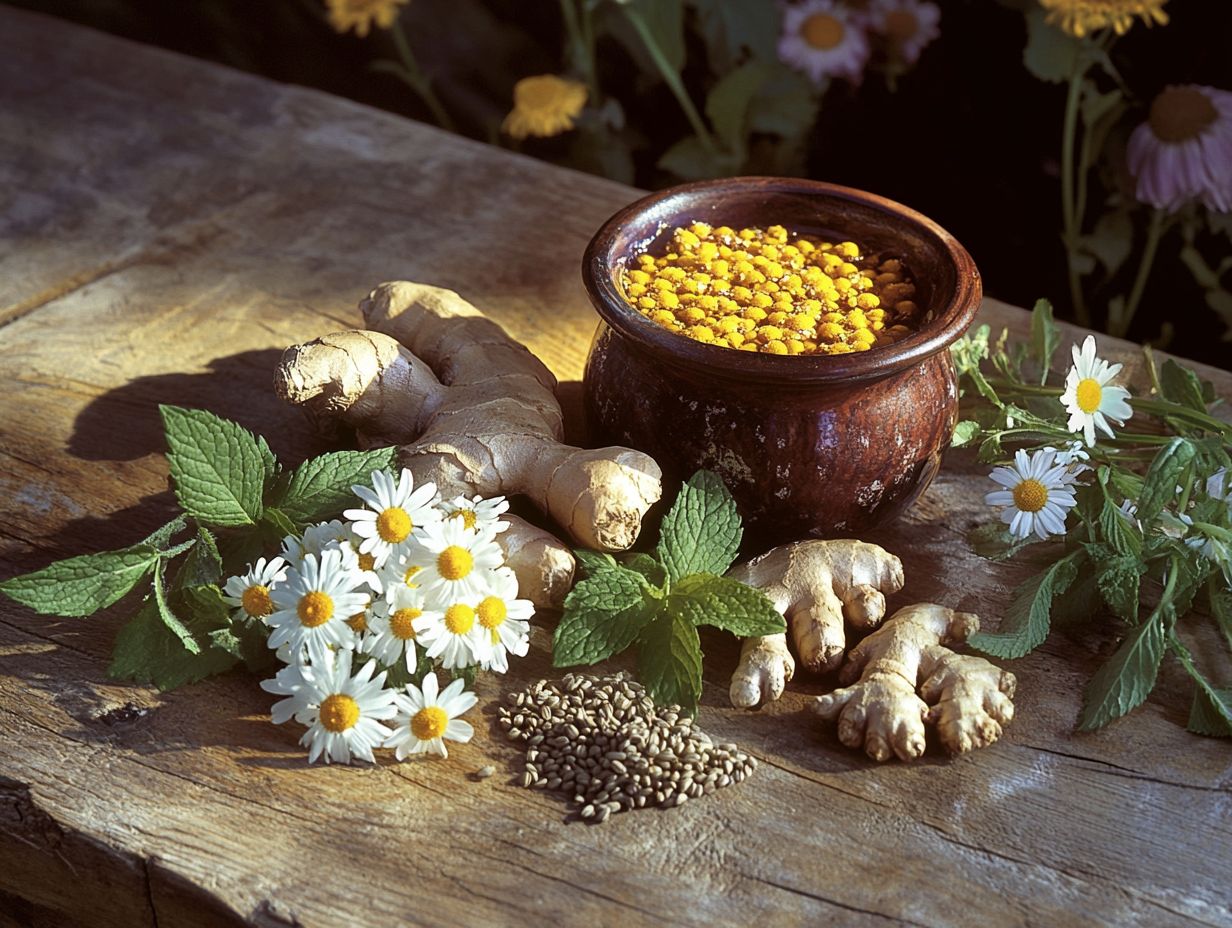
Evening Primrose Oil is highly regarded for its abundant a type of healthy fat called GLA, making it a superb choice if you’re looking to ease PMS symptoms and promote overall hormonal balance through thoughtful dietary choices.
This oil also plays a crucial role in supporting your body’s natural hormone production. It can help reduce bloating, mood swings, and breast tenderness commonly associated with menstrual discomfort. Adding Evening Primrose Oil to your routine may help make your monthly cycles easier.
Its anti-inflammatory properties also enhance your overall wellness, alleviating menstrual cramps while fostering a harmonious hormonal environment. Thus, integrating this supplement into your daily choices could significantly elevate your quality of life during those challenging days each month.
5. Chaste Tree Berry
Chaste Tree Berry, commonly referred to as Vitex, is a remarkable herb celebrated for its ability to regulate menstrual cycles and restore hormone balance. It offers you a natural support system as you navigate various reproductive health challenges.
This ancient remedy has garnered significant recognition for its effectiveness in alleviating symptoms linked to hormonal fluctuations, such as mood swings and breast tenderness. By promoting balanced estrogen and progesterone levels, you might find relief from menstrual irregularities and enjoy a renewed sense of well-being.
This herb aids your body in adjusting hormone production, fostering more predictable cycles. As a result, many are embracing Chaste Tree Berry as a holistic approach to reproductive health, ultimately enhancing their quality of life.
What Is Herbal Medicine and How Does It Work?
Herbal medicine offers you a holistic approach that taps into nature s vast resources to promote health and wellness. By leveraging quality herbs and time-tested formulations, this practice addresses a variety of health conditions all under the careful guidance of a health practitioner to ensure safety and efficacy.
Rooted in numerous cultures, from traditional Chinese medicine to Ayurveda, this ancient practice provides a profound understanding of the interconnectedness between plants and human health. By focusing on natural remedies, you can harness the therapeutic properties of herbs that have been revered for centuries.
Make sure you only choose high-quality herbs, as not all plants are created equal. The effectiveness of treatments can vary significantly based on their purity and preparation. Health professionals advocate for personalized herbal formulations tailored to your unique needs, maximizing benefits while minimizing potential risks.
This integrative approach encourages a balanced perspective on health, embracing both modern science and traditional wisdom.
What Are the Benefits of Using Herbal Remedies for Women’s Health?
The benefits of using herbal remedies for menstrual discomfort in women’s health are extensive, providing invaluable support for hormonal changes, emotional well-being, and overall vitality. Adaptogenic herbs, in particular, play a pivotal role in helping you manage stress and enhance your quality of life.
Incorporating these natural alternatives into your daily routine can empower you while addressing the unique challenges encountered at various life stages. For example, adaptogenic herbs like ashwagandha and rhodiola can significantly lower stress levels, promoting a more balanced mindset.
These herbal solutions can help regulate hormonal fluctuations, alleviating symptoms associated with menstruation and menopause. This holistic approach not only nurtures your physical health but also builds emotional resilience, allowing you to feel more centered and at peace amidst life’s inevitable ups and downs.
What Are the Potential Risks and Side Effects of Herbal Remedies for Women’s Health?
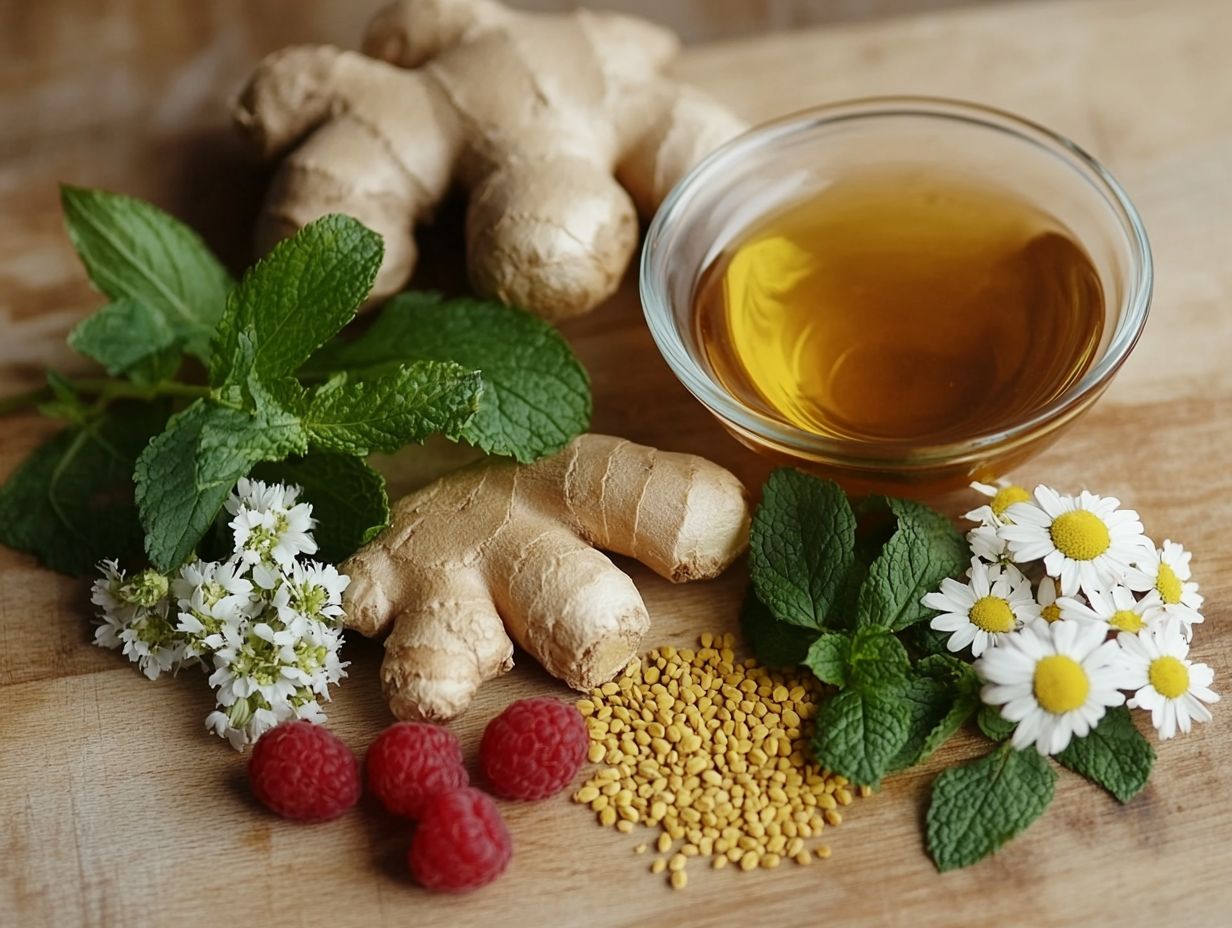
While herbal remedies can be incredibly beneficial for women’s health, it s essential for you to remain aware of the potential risks and side effects. Consulting with a qualified health professional for personalized advice and safe usage is vital.
You might think that natural products are always a safe bet, but it’s important to understand that some herbal supplements which are products made from plants to promote health can interact with medications or worsen existing health conditions. Factors such as dosage, preparation method, and your unique body chemistry can significantly impact how these remedies work for you.
Therefore, seeking guidance from a qualified health professional can help you navigate these risks, ensuring that any herbal remedy you choose is tailored to your specific needs and minimizes the likelihood of unwanted side effects.
How Can One Incorporate Herbal Remedies into Their Daily Routine for Women’s Health?
Incorporating herbal remedies into your daily routine for women’s health can be a transformative practice! It enhances your overall wellness and effectively addresses various health conditions through the thoughtful integration of high-quality herbs.
By understanding the different forms of herbal medicine such as teas, tinctures, and capsules you can select the option that best aligns with your preferences and lifestyle. It s crucial to consider the appropriate dosage and timing to achieve maximum efficacy. For instance, taking certain herbs on an empty stomach can significantly enhance their absorption.
If you’re managing symptoms related to hormonal imbalances or stress, establishing a consistent schedule for your herbal intake can truly work wonders! Journaling your experiences with these remedies can also be incredibly helpful in tracking their effects and making necessary adjustments to optimize your health benefits.
What Are Some Common Health Issues for Women That Can Be Treated with Herbal Remedies?
Common health issues for women such as menstrual disorders, hormonal imbalances, and emotional stress can often be alleviated through targeted herbal remedies, offering a natural path to wellness.
These conditions can disrupt daily life, creating discomfort and challenges that many find difficult to navigate. For instance, menstrual disorders like irregular cycles can greatly benefit from herbal options such as chasteberry, which is celebrated for its potential to support hormonal balance. If you’re grappling with emotional stress, adaptogens which are natural substances that help your body manage stress like ashwagandha may provide the solace you seek, known for their calming effects.
Incorporating these remedies thoughtfully into your wellness routine not only addresses specific health concerns but also fosters overall vitality and resilience!
What Are Some Tips for Choosing and Using Herbal Remedies for Women’s Health?
Choosing and using herbal remedies effectively for women’s health demands a careful approach, where quality herbs, individual health needs, and proper guidance play pivotal roles in achieving optimal results.
As you embark on this journey, it s essential to delve into the world of herbal options and assess their efficacy for various health conditions. Remember, what works wonders for one person may not necessarily be the best fit for you.
Understanding the unique properties of high-quality herbs is crucial, along with being mindful of any potential interactions with medications or pre-existing health issues. Consulting with a healthcare professional can offer you personalized insights and tailored recommendations!
By approaching herbal remedies with careful consideration and awareness, you can significantly enhance your well-being and unlock the myriad benefits these natural solutions have to offer.
Frequently Asked Questions
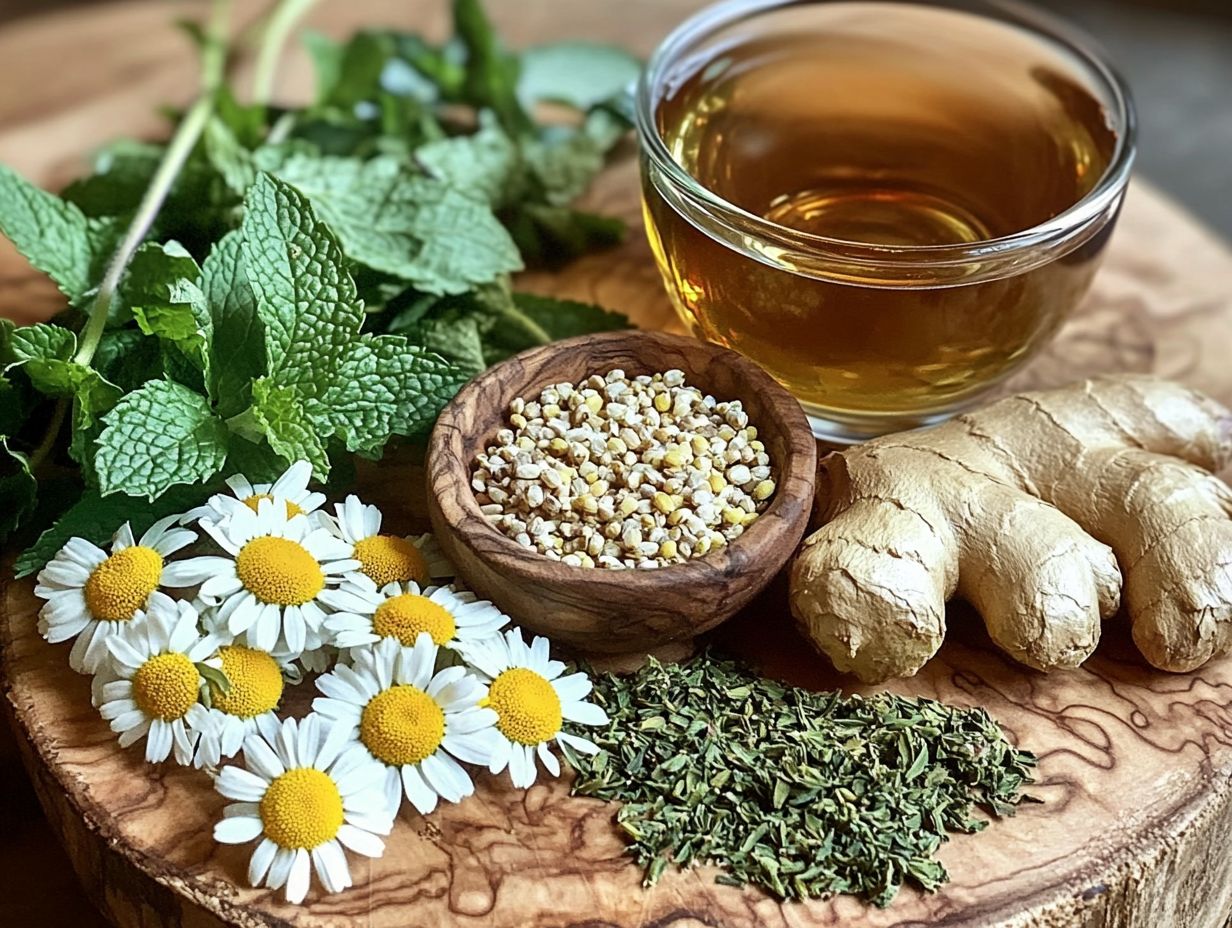
What are 5 herbal remedies for women’s health?
1. Red clover: This herb balances hormones and relieves menopause symptoms. It may also improve bone density and reduce osteoporosis risk.
2. Dong Quai: Used in traditional Chinese medicine, this herb treats menstrual cramps and promotes fertility.
3. Black cohosh: This remedy alleviates menopause symptoms like hot flashes and mood swings.
4. Evening primrose oil: This oil contains beneficial fatty acids that help regulate hormones and improve PMS, menopause, and endometriosis symptoms.
5. Chaste tree berry: For centuries, this herb has been used to regulate menstrual cycles and relieve PMS symptoms.
Benefits of Herbal Remedies
These remedies help balance hormones and regulate menstrual cycles. They also alleviate menopause and PMS symptoms, and support overall reproductive health.
Potential Side Effects
While generally safe, consult a healthcare professional before using herbal remedies. Some may interact with medications or cause side effects, especially for individuals with certain health conditions.
Using Herbal Remedies with Traditional Treatments
These remedies can complement traditional treatments. Always consult a healthcare professional first to avoid interactions or risks.
Choosing the Right Herbal Remedy
Research and consult a healthcare expert to find the best herbal remedy for you. Different herbs work differently for each person.
FDA Regulation of Herbal Remedies
Herbal remedies are not FDA-regulated. However, reputable manufacturers follow good practices for safety and quality. Always buy from trusted brands and read labels carefully.

